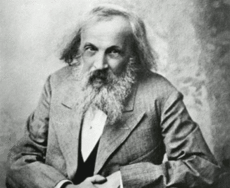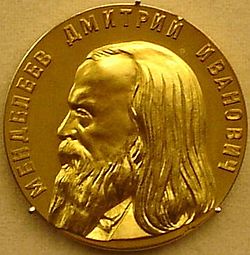
Dmitri Mendeleev
Did you know...
This wikipedia selection has been chosen by volunteers helping SOS Children from Wikipedia for this Wikipedia Selection for schools. With SOS Children you can choose to sponsor children in over a hundred countries
Dmitri Ivanovich Mendeleev (sometimes spelled Mendeleyev; Russian: Дми́трий Ива́нович Менделе́ев listen) (8 February [ O.S. 27 January] 1834 – 2 February [ O.S. 20 January] 1907), was a Russian chemist and inventor. He is credited as being the creator of the first version of the periodic table of elements. Unlike other contributors to the table, Mendeleev predicted the properties of elements yet to be discovered.
Life
Dmitri Mendeleev was born in Tobolsk, Siberia, to Ivan Pavlovich Mendeleev and Maria Dmitrievna Mendeleeva (born Kornilieva). His grandfather was Pavel Maximovich Sokolov, a Russian priest. Ivan, along with his brothers, obtained new family names while attending Tver theological seminary.
Mendeleev was the youngest of 17 siblings, but the exact number differs among sources. At the age of 13, after the passing of his father and the destruction of his mother's factory by fire, Mendeleev attended the Gymnasium in Tobolsk.
In 1849, the now poor Mendeleev family relocated to St. Petersburg, where he entered the Main Pedagogical Institute in 1850. After graduation, an illness that was diagnosed as tuberculosis caused him to move to the Crimean Peninsula on the northern coast of the Black Sea in 1855. While there he became chief science master of the Simferopol gymnasium №1. He returned with fully restored health to St. Petersburg in 1857.
Between 1859 and 1861, he worked on the capillarity of liquids and the workings of the spectroscope in Heidelberg. In the late august of 1861 he wrote his first book on the spectroscope in which it received high acclaim. In 1862, he married Feozva Nikitichna Leshcheva. Mendeleev became Professor of Chemistry at the Saint Petersburg Technological Institute and the University of St. Petersburg in 1863 he achieved tenure in 1867, and by 1871 had transformed St. Petersburg into an internationally recognized centre for chemistry research. In 1865 he became Doctor of Science for his dissertation "On the Combinations of Water with Alcohol". In 1876, he became obsessed with Anna Ivanova Popova and began courting her; in 1881 he proposed to her and threatened suicide if she refused. His divorce from Leshcheva was finalized one month after he had married Popova in early 1882. Even after the divorce, Mendeleev was technically a bigamist; the Russian Orthodox Church required at least 7 years before lawful re-marriage. His divorce and the surrounding controversy contributed to his failure to be admitted to the Russian Academy of Sciences (despite his international fame by that time). His daughter from his second marriage, Lyubov, became the wife of the famous Russian poet Alexander Blok. His other children were son Vladimir (a sailor, he took part in the notable Eastern journey of Nicholas II) and daughter Olga, from his first marriage to Feozva, and son Ivan and a pair of twins from Anna.
Though Mendeleev was widely honored by scientific organizations all over Europe, including the Copley Medal from the Royal Society of London, he resigned from St. Petersburg University on August 17, 1890.
In 1893, he was appointed Director of the Bureau of Weights and Measures. It was in this role that he was directed to formulate new state standards for the production of vodka. His fascination with molecular weights led him to conclude that to be in perfect molecular balance, vodka should be produced in the ratio of one molecule of ethyl alcohol diluted with two molecules of water, giving a dilution by volume of approximately 38% alcohol to 62% water. As a result of his work, in 1894 new standards for vodka were introduced into Russian law and all vodka had to be produced at 40% alcohol by volume.
Mendeleev also investigated the composition of oil fields, and helped to found the first oil refinery in Russia.
Mendeleev died in 1907 in St. Petersburg, Russia from influenza. The Mendeleev crater on the Moon, as well as element number 101, the radioactive mendelevium, are named after him.
Other achievements
Mendeleev made other important contributions to chemistry. The Russian chemist and science historian L.A. Tchugayev has characterized him as "a chemist of genius, first-class physicist, a fruitful researcher in the fields of hydrodynamics, meteorology, geology, certain branches of chemical technology (explosives, petroleum, and fuels, for example) and other disciplines adjacent to chemistry and physics, a thorough expert of chemical industry and industry in general, and an original thinker in the field of economy." Mendeleev was one of the founders, in 1869, of the Russian Chemical Society. He worked on the theory and practice of protectionist trade and on agriculture.
In an attempt at a chemical conception of the Aether, he put forward a hypothesis that there existed two inert chemical elements of lesser atomic weight than hydrogen. Of these two proposed elements, he thought the lighter to be an all-penetrating, all-pervasive gas, and the slightly heavier one to be a proposed element, coronium.
Mendeleev devoted much study and made important contributions to the determination of the nature of such indefinite compounds as solutions.
In another department of physical chemistry, he investigated the expansion of liquids with heat, and devised a formula similar to Gay-Lussac's law of the uniformity of the expansion of gases, while as far back as 1861 he anticipated Thomas Andrews' conception of the critical temperature of gases by defining the absolute boiling-point of a substance as the temperature at which cohesion and heat of vaporization become equal to zero and the liquid changes to vapor, irrespective of the pressure and volume.
Mendeleev is given credit for the introduction of the metric system to the Russian Empire.
He invented pyrocollodion, a kind of smokeless powder based on nitrocellulose. This work had been commissioned by the Russian Navy, which however did not adopt its use. In 1892 Mendeleev organized its manufacture.
Mendeleev studied petroleum origin and concluded that hydrocarbons are abiogenic and form deep within the earth. He wrote: "The capital fact to note is that petroleum was born in the depths of the earth, and it is only there that we must seek its origin." (Dmitri Mendeleev, 1877)




